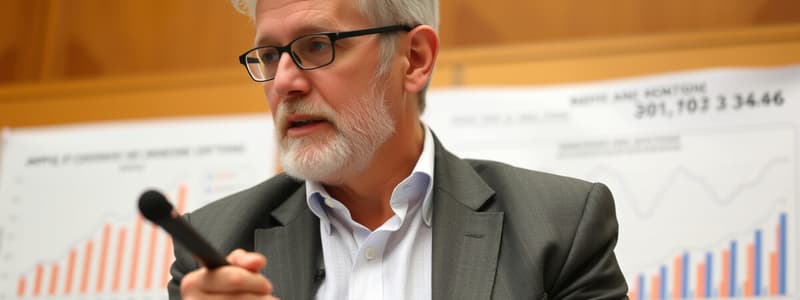Podcast
Questions and Answers
What is a key characteristic of applied science in economics?
What is a key characteristic of applied science in economics?
- Problem-solving orientation (correct)
- Exclusively theoretical analysis
- Focus on the abstract concepts of economics
- Uniform application of one discipline only
Which method involves simulating economic scenarios to predict outcomes?
Which method involves simulating economic scenarios to predict outcomes?
- Mathematical modeling (correct)
- Surveys
- Statistical analysis
- Case studies
What application of economics focuses on advising governments regarding fiscal and monetary policy decisions?
What application of economics focuses on advising governments regarding fiscal and monetary policy decisions?
- Public policy (correct)
- Behavioral economics
- Development economics
- Business strategy
What is one of the challenges faced in applied economics?
What is one of the challenges faced in applied economics?
Which approach in economics integrates insights from multiple fields to inform economic analysis?
Which approach in economics integrates insights from multiple fields to inform economic analysis?
What is the primary focus of behavioral economics?
What is the primary focus of behavioral economics?
What type of data analysis is commonly used to inform economic policies?
What type of data analysis is commonly used to inform economic policies?
What does applied economics help in predicting?
What does applied economics help in predicting?
Flashcards are hidden until you start studying
Study Notes
Definition of Applied Science in Economics
- Economics is often classified as a social science.
- It applies scientific methods to analyze economic phenomena.
- Focuses on practical application of economic theories and principles to real-world situations.
Key Characteristics
- Empirical Analysis: Utilizes data and statistical methods to test theories and inform policies.
- Interdisciplinary Approach: Integrates insights from various fields like psychology, sociology, and political science.
- Problem-Solving Orientation: Aims to address specific economic issues, such as inflation, unemployment, and resource allocation.
Methods Used in Economics
- Statistical Analysis: To interpret economic data and trends.
- Mathematical Modeling: To simulate economic scenarios and predict outcomes.
- Case Studies: In-depth examination of specific economic events or policies.
- Experiments and Surveys: To gather data on consumer behavior and economic decision-making.
Applications of Economics
- Public Policy: Advises governments on fiscal and monetary policy decisions.
- Business Strategy: Informs firms on market trends, pricing strategies, and competition.
- Development Economics: Addresses issues related to economic growth, poverty alleviation, and resource management.
- Behavioral Economics: Studies how psychological factors affect economic decisions.
Importance of Economics as an Applied Science
- Helps in understanding complex economic relationships and dynamics.
- Provides tools for effective decision-making in business and government.
- Aids in predicting economic outcomes and preparing for market fluctuations.
- Enhances the ability to evaluate the impacts of policies and initiatives on society.
Challenges in Applied Economics
- Data Limitations: Incomplete or biased data can lead to incorrect conclusions.
- Model Assumptions: Simplified models may not capture all real-world complexities.
- Dynamic Environments: Economic conditions are ever-changing, requiring constant adaptation of theories and models.
Definition of Applied Science in Economics
- Classified as a social science that utilizes scientific methods for analyzing economic phenomena.
- Emphasizes practical application of economic theories to address real-world scenarios.
Key Characteristics
- Empirical Analysis: Employs data and statistical methods for theory testing and policy formulation.
- Interdisciplinary Approach: Combines insights from psychology, sociology, and political science to enrich economic understanding.
- Problem-Solving Orientation: Targets specific issues like inflation, unemployment, and resource allocation.
Methods Used in Economics
- Statistical Analysis: Interprets economic data and identifies trends for informed decision-making.
- Mathematical Modeling: Simulates economic scenarios for predicting potential outcomes.
- Case Studies: Offers in-depth insights into particular economic events or policies to extract lessons.
- Experiments and Surveys: Collects data on consumer behavior and economic decision-making processes.
Applications of Economics
- Public Policy: Guides governments in making fiscal and monetary policy decisions based on economic analysis.
- Business Strategy: Equips firms with insights on market trends, pricing strategies, and competitive dynamics.
- Development Economics: Focuses on economic growth, poverty alleviation, and sustainable resource management approaches.
- Behavioral Economics: Examines the impact of psychological factors on economic behavior and decision-making.
Importance of Economics as an Applied Science
- Enhances understanding of intricate economic relationships and dynamics within the economy.
- Offers tools for effective decision-making that benefit both businesses and government entities.
- Improves forecasting abilities regarding economic outcomes and market fluctuations.
- Enables assessment of policy impacts and societal initiatives on various community aspects.
Challenges in Applied Economics
- Data Limitations: Recognition that incomplete or biased data can lead to flawed conclusions and recommendations.
- Model Assumptions: Awareness that simplified economic models may overlook complex real-world conditions.
- Dynamic Environments: Economic landscapes are constantly shifting, necessitating ongoing adjustments to theories and models.
Studying That Suits You
Use AI to generate personalized quizzes and flashcards to suit your learning preferences.




